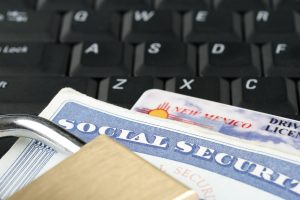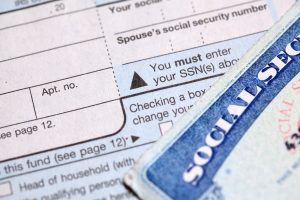A scam email is attempting to fool recipients into disclosing their Social Security information. At first glance, the email appears to come from the Social Security Administration. An Idaho resident, who has chosen to remain anonymous to protect his and his wife’s privacy, disclosed the contents of this fraudulent email.
These Lewiston locals received the email asking them to login to review their annual Social Security Statement. The email re-directs recipients to a website where they can enter either their username and password or create a new profile. (At first glance it could be easy to fall hook, line, and sinker for this phishing scam.)
According to the couple, the page did not immediately look fraudulent. There were no unusual factors that would indicate a need to be suspicious. Similar to most websites, users are directed to provide second-factor authentication by entering a security code issued via email or text message.The email also explained that the statements are now online to save money and reduce paper. (These fraudsters used the guise of saving the environment to legitimize their virtual scam.)
It wasn’t until the woman began to make a new profile that some of the questions struck her as odd. She proceeded to get in touch with a representative of the SSA where she was informed that this email and linked website were in fact fraudulent. The SSA doesn’t use email or other unsecure methods to contact users or ask for personal information. If compromised, one could lose their savings or access to their Social Security benefits. (It’s hard to believe the consequences of following an email’s instructions could be losing your entire life’s savings.)
According to the AARP Fraud Resource Center, this email had identifiable markings of a fraudulent email scam. There was no name after the ‘Dear’, whereas most official letters list the person they are trying to contact. Another red flag was that there was a link provided within the email. These are a few of the most common attributes of a phishing email.
If someone falls victim to a phishing scam they can file a complaint with the FTC by calling 877-382-4357 or forward the solicitation to phishing@irs.gov. Also, visit the FTC’s website identitytheft.gov to put a recovery plan in action.
——————————————————–
Today’s Fraud of the Day comes from an article, “Scam Alert: phishing email appears to come from Social Security Administration,” posted on klewtv.com on May 6, 2020.
LEWISTON, ID — A scam alert that comes in the form of an email appears to look like it’s from the Social Security Administration. A local resident wants you to know what to watch out for.
The LC Valley resident asked to remain anonymous as he and his wife’s personal information could be compromised right now but he’s still speaking out as best he can, to warn you.




